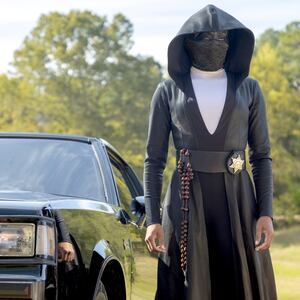As one of the voices featured in the documentary Healing From Hate: Battle for the Soul of a Nation, which premiered at the DOC NYC film festival, I have seen several cuts of the film in its development. The part I am drawn to the most, the part that touches me deeply every time I watch, is the footage of Randy walking defiantly through a crowd of protesters, wearing a shirt with swastikas, on his way to see Richard Spencer speak. The more he is cursed, spat on, punched and kicked the more defiant and determined he becomes to wade through the personal onslaught—until something extraordinary happens.
A young African-American activist, radio host and DJ named Julius engages Randy with the desire to speak with him, to understand him, and the two split off as Randy agrees to have a dialogue with Julius away from the crowd. The result of that dialogue is the unlikely friendship and bond between these two men that exists to this day. Curiosity. There is an old expression that “hurt people hurt people” and when we can engage people in the darkest expressions of their despair with curiosity and understanding, we set the foundation for change and healing. As a co-founder of Life After Hate, I can attest to the changes hundreds of people have made through similar efforts by our organization.
I came from an affluent home, my father was a doctor and I attended private schools, yet I still found myself searching for that place to belong, to find acceptance and a sense of purpose. It wasn’t so much the ideology that was the attractor for me, but rather what came with it: the illusion of power when I felt powerless, false acceptance when I felt unlovable, and I confused notoriety and attention with a grandiose sense of my self-importance erasing the feeling of being invisible.
As human beings, we operate from one of two places, fear or love, and we get to choose which one. The choice isn’t always an easy one, and it requires great courage to be the example we wish to see in this world. Nobody said this would be easy, but the great division that exists in our society is not going to be solved by staying in our comfort zones. We are way beyond that point. Everything is connected, and when we judge and dehumanize another person for their expressions of despair, when we refuse to acknowledge the humanity in those whose behavior or ideology is abominable, we deny a part of our humanity.
Compassion was at the forefront of my transformation in the form of my two children, born 15 months apart, that began the thawing process of what appeared to be a very cold and uncaring heart. Someone asked me, “How did you lose your humanity?” to which I promptly replied, “I didn’t lose it, I traded it for acceptance and approval until there was nothing left.” I was able to open my heart to them partly because the unconditional love of children is infectious and partly because it is safe to do so with children. They aren’t capable of shaming, ridicule, or rejection (at least not until they are much older). Before they could speak they were teaching me that I was, in fact, lovable when deep down inside I believed the opposite—that I was weak, powerless, deeply flawed and unworthy. I spent most of my life hiding those lies from the world as well as from myself. I thought I projected an image into the world that I believed was the opposite of those flaws. How wrong I was. When my teeth were knocked out in my living room in front of my children by the very people I had considered my compatriots, the hypocrisy and toxicity of this movement was laid bare and my departure became a certainty.
When we are compassionate with someone it is like we have a mirror that allows them to see their full humanity reflected at them when they are incapable of seeing it themselves. We help those people recognize their humanity, and in doing so help those people recognize the humanity in others. I truly believe that the level to which we dehumanize others is a mirror reflection of our dehumanization and disconnection, and we can’t recognize the humanity in others unless we can recognize our own humanity. Life After Hate’s philosophy is that nobody is irredeemable, and that message is also at the core of the film. It is hard to have compassion for someone who has no compassion themselves, but aren’t those the people who need it most? Everyone is capable of living and contributing to society as well as repairing and healing the very harms they created.
The ongoing counseling, therapy, and self-work that is delivered by and through Life After Hate is an enormous task as we look to attract trained volunteers and empower counseling resources in local communities, but the biggest challenge is removing the stigma and demystifying populations caught up in repugnant ideologies and violent extremism. These are very human problems with very human solutions, and as a society, we must call them out but also be prepared to call them in.The film plays an important role in highlighting that radical change is possible but it requires courage and belief that this is true.
It is also important to point out that it is not the responsibility of people of color or marginalized communities to step up and take this on as Julius did, but if he can do it, then what is our excuse for not following his courageous example?
Tony McAleer is author of The Cure for Hate: A Former White Supremacist’s Journey from Violent Extremism to Radical Compassion and is co-founder and board chair for Life After Hate. For more information about HEALING FROM HATE: BATTLE FOR THE SOUL OF A NATION please visit: https://www.bigtentproductions.nyc.


